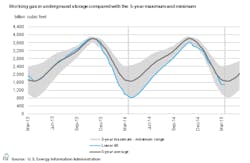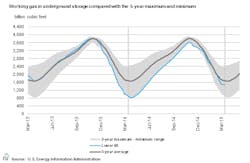MARKET WATCH: Oil prices surge on Saudi airstrikes in Yemen
US light, sweet crude oil prices settled more than $1 higher on the New York market in Mar. 25 trading and then surged in early Mar. 26 trading on reports that Saudi Arabia and its allies launched airstrikes in Yemen, which analysts said renewed concerns about possible oil supply disruptions.
The strikes began after Yemen President Abed Rabbo Mansour Hadi fled the port city of Aden by boat when Iranian-backed Houthi militants closed in.
Yemen is not a major crude oil producer, but it lies next to Bab el-Mandeb strait, a major oil transportation corridor. Oil tankers moving through the Suez Canal also pass through the Bab el-Mandeb, which is 18 miles wide at its narrowest point. The US Energy Information Administration said closure of the Babel Mandeb could stop oil tankers moving from the Middle East to the Suez Canal.
“The price rise is likely to be short-lived, but I’m sure traders will use it to take some profit as the world briefly remembers that the Middle East is volatile,” Richard Gorry, managing director of JBC Energy Asia, told MarketWatch, a Dow Jones subsidiary. Gorry’s comments to MarketWatch came during Platts Oil Refining conference in Singapore.
He said he doesn’t expect the airstrikes actually will change the availability of world crude oil.
Regarding US natural gas in underground storage across the Lower 48, EIA estimated levels at a rounded 1.5 tcf as of Mar. 20, which was a net increase of 12 bcf from the previous week.
The Natural Gas Storage report said stocks were 575 bcf higher than last year at this time and 194 bcf below the 5-year average of a rounded 1.7 tcf.
Energy prices
The New York Mercantile Exchange May crude oil contract rose $1.70 on Mar. 25 to $49.21/bbl. The June contract climbed $1.65 to settle at $50.78/bbl.
The natural gas contract for April decreased 6¢ to a rounded $2.72/MMbtu. The Henry Hub, La., gas price was $2.74/MMbtu, down 4¢.
Heating oil for April delivery rose 2¢ to a rounded $1.73/gal. Reformulated gasoline stock for oxygenate blending for April was up 3.7¢ to a rounded $1.84/gal.
The May ICE contract for Brent crude oil was up $1.37, settling at $56.48/bbl. The June contract rose $1.23¢ to $57.44/bbl. The ICE gas oil contract for April was up $1.25 to $524.50/tonne.
The average price for the Organization of Petroleum Exporting Countries’ basket of 12 benchmark crudes on Mar. 25 was $50.83/bbl, down 9¢.
Contact Paula Dittrick at [email protected].
*Paula Dittrick is editor of OGJ’s Unconventional Oil & Gas Report.
About the Author
Paula Dittrick
Senior Staff Writer
Paula Dittrick has covered oil and gas from Houston for more than 20 years. Starting in May 2007, she developed a health, safety, and environment beat for Oil & Gas Journal. Dittrick is familiar with the industry’s financial aspects. She also monitors issues associated with carbon sequestration and renewable energy.
Dittrick joined OGJ in February 2001. Previously, she worked for Dow Jones and United Press International. She began writing about oil and gas as UPI’s West Texas bureau chief during the 1980s. She earned a Bachelor’s of Science degree in journalism from the University of Nebraska in 1974.


